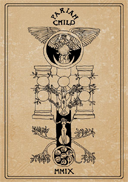Sandra Silver

Ever since discovering her beautifully haunting voice in the 1990s via Paul Chain singles, albums and live performances, I have imagined a charismatic poet, performer and singer captivating audiences from the stage of intriguing Italian clubs. Curious to hear how her artistic journey began and keen to explore the role collaborative music continues to play in her life, she was invited to share that story. It also coincides with the recent launch of “The Atlantean Afterlife (…Living Beyond)” by Tony Tears on 26 March 2021, where she provides lead vocals alongside her male counterpart, David Krieg.
Pariah Child bids you enter, Sandra! Make yourself at home.
Hello to you Danny and all friends who follow Pariah Child…
Knowing very little about your roots, what are your earliest memories of performing arts?
I was a very introverted child and already at an early age I felt different from my peers. I knew that life was not like fairy tales and I locked myself up in an imaginary world, where the imaginary friends were my deceased grandparents and I deepened them from there through the art of Spiritism.
Did you have a burning passion for music, poetry, drama or art from a young age?
In adolescence, I felt the need to express my emotions with dance and song yet always in solitude.
What were your personal favourites from these mediums? Why?
When I reached adulthood, I started attending concerts by Goth and Punk groups. From that point in time, I started moving deeper into dark genres, where I became lost in my emotions.
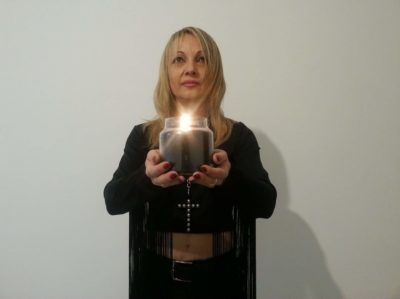
How did you explore and nurture this creative spirit within as you grew? Was it slow and gradual or was there an urgency to express?
From Goth, I listened to The Damned and The Sister of Mercy. In Punk, it was The Sex Pistols, as well as Italian bands (always in these same genres), right up to Paul Chain Violet Theatre. Of the latter, I was a big fan and in the ‘90s I became his partner.
What about the wider impact of your homeland and culture?
Each experience was a stage, another piece in my continual growth. Whilst I sing in the genres I discovered through Paolo and Antonio, the Italian Dark Sound, in reality, I love all styles of music. I love Italian music, especially the one contaminated by the New Wave like Matia Bazar, or even ‘70s and ‘80s Pop like Kate Bush. In fact, in some concerts other than Tony Tears, I played cover songs by both of these artists.
When was your first experience on the stage? What was your role in the performance? Looking back, how did it feel?
My stage debut as a live performer was in 1990. I had no idea what to do. I simply interpreted what I felt by improvising my emotions…
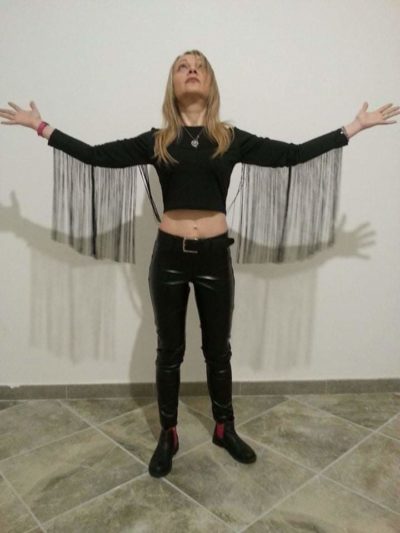
Have you encountered the same stirring sentiments each time you perform? Or does the environment alter the experience in any way?
Certainly the environment helps to find the right atmosphere. The same can be said for the mood of the audience. However, I always focused intently on my emotions, in the moment, throughout my performance.
My introduction to your singing voice came via Paul Chain albums. How and when did you meet? Was the “Sangue” 7” Single your first creative collaboration in a studio setting?
As I already mentioned, way back in 1990, I met Paolo at a concert. It took place in a former slaughterhouse. Shortly after that experience, I found myself in another world. I began appearing in a few concerts as a live performer. Believe it or not, “Sangue” was not the first vocal collaboration. It was, in fact, “Presence of the Soul’s Forest” when, one day, I found myself in the studio house, a huge room in front of a microphone, which I still remember vividly. Paolo, he placed me on a platform (figuratively speaking), I started improvising for the first time on an unknown (musical) base in a phonetic language. I was in some form of trance. I didn’t have the faintest idea what I had done in the “Presence of the Soul’s Forest” yet this song marked the beginning of my vocal collaboration.
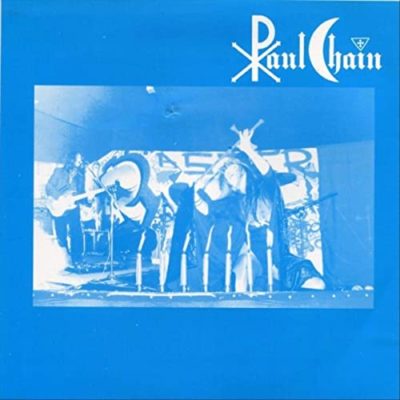
Returning to the single, please talk about this particular song and your approach to it. As no lyrics were printed on the sleeve, to what extent did you prepare melodies or phrases beforehand versus improvising on the day?
Okay, coming back to the split with our friends in Eversor, yes, “Sangue” was my first experience in our native language. For some strange reason, I don’t remember the experience well, but it seems to me that I wrote the text and enjoyed doing it. Honestly, I’m not a lover of patterns.
Come the following year, the album, “Dies Irae” was very much you, as the voice, and Paul Chain providing the instrumental canvas. How do you remember that period? Do any songs, in particular, still inspire strong feelings?
Personally speaking, I am very attached to the “Dies Irae” album. It was the first real step in the use of my voice. Certainly the piece I am most fond of is the “Presence of the Soul’s Forest” because I still remember the emotion in resenting myself and recognizing myself. I do not deny the amazement I felt. Who was I?
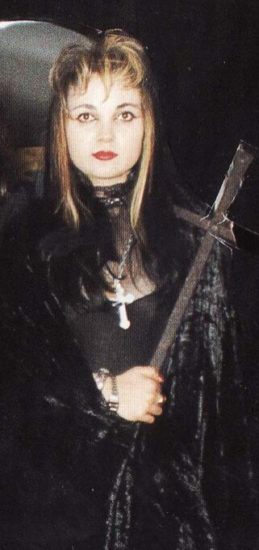
“Emisphere” was a daring double album. A conceptual piece. A spiritual journey. Would you elaborate upon the themes?
I perceived “Emisphere” as a continuum of “Dies Irae” – an atmosphere that is felt, lived and Interpreted. I state that, as per the “Dies Irae” recordings, I did not know the musical bases upon which it was built. Once again, “Emisphere” was completely improvised.
This recording, to me, could be described as performance art. The vocal layers you provided in “I Want You” are disturbing. Almost like a traumatic scene from a play. Like Moorcock reading Macbeth. “Transformation” also feels lived, rather than sung, the change real. What do you think about my reading?
Do you think that I lived in Paul Chain’s home studio and I even recorded my voice in the kitchen or bathroom? Ha! No. For this reason, I agree with your observation.
Which is your favourite piece? Why?
“I Want You” because it is absolute madness! “I Want You” is also the piece that best represents me.
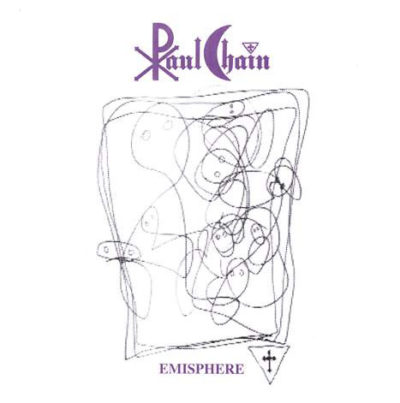
Without you, “Emisphere” would have lost much of its haunted, anguished and beautiful flavour. How much energy and direction did you invest in the process? Did you achieve everything you had hoped to capture?
Honestly speaking, in my interpretations, I have revealed between the lines what I am, what we are, and I have never set myself a goal or at least one of pleasure. I lived the moment with my emotions. No expectations. I did it for the simple need of giving and giving myself.
I imagine that your live band experiences with Paul Chain were numerous and diverse. Were you more at home on or off stage? Do you still cherish any memories from “In Concert” (1993), where you were credited as a performer or “Official Live Bootleg” (1999) as the singer in the red cape?
If the formation was comprised of Jazz musicians and the concert assumed a Jazz setting, I adapted and improvised. If the formation centred on Classic Rock and then on Doom, I sang some pieces, like Jimi Hendrix and I was a performer. Always fluid and in the moment…
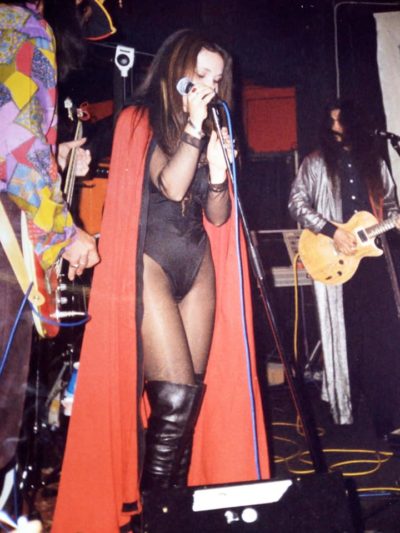
Have you any sense of how many concerts you played in the ‘90s?
Well, many years have passed and I honestly cannot remember exactly how many concerts I did with Paul Chain. Perhaps dozens and dozens throughout Italy and with many different formations…
Close your eyes and describe the most intense aspect of any performance you recall? Why were you so deeply moved in that moment?
Each and every shred of my memories contain emotions. It is truly impossible to choose just one. Each concert gave me something different.
The last three songs captured from this era were presented on “Unreleased Volume 1” collection. My cousin used to play “She Tomy My I” on repeat whenever I visited! Presumably they were recorded before 2003? Do any other significant memories from these sessions coming flooding back?
“She Tomy My I” was certainly recorded well before 2003 given that I left Paolo in 1998/99 (for many reasons). To this day, however, I remember several musicians with fondness. There was a genuine friendship, and from time to time, we still hear from them.
The curtain (apparently) fell for many years in the new millennium. Well, until the Italian Dark Sound of Genova invoked your ghost circa 2017/18… Where did you go? Were you pursuing other interests outside of this movement? Ultimately, what was it about Tony Tears (and to a certain extent Abysmal Grief) that resonated with you to make a return?
Leaving the Paul Chain project out of necessity, I took a couple of years off. Then I rediscovered writing in poetry. I ventured deep into myself, to get to know myself better, thanks to, and through, esoteric techniques.
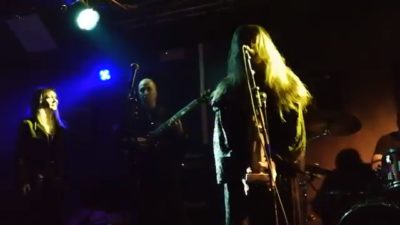
Since then, you have already dedicated energies to two Tony Tears records and performed a number of concerts with the band. How has your relationship evolved and deepened during such a productive period?
The meeting with Antonio (my current partner) in 2016, was like dusting off my ancient vocal arts, which, thanks to greater technique and spiritual growth, allowed me to pick up and develop my expression in “Demons…” and the “30th Anniversary EP” that followed it. As already hinted, there was also a short collaboration with my friend Roby from Abysmal Grief on the “Blasphema Secta” LP…
In the context of Tony Tears, how important is your vocal partnership with David Krieg? Sometimes you play separate roles. On other occasions your voices overlap. So how intuitive are you musically, emotionally and spiritually as a pair?
The collaboration with Davide is very important. We understand each other and are tuned to the same wavelength. We both have our spaces of expression and there is a good feeling between us. In short, we have a good time!
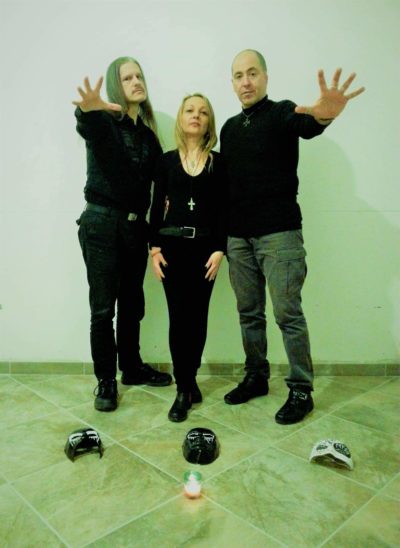
In spite of time passing, I’m delighted to hear that your voice has not diminished in presence! Whether spoken or sung, it still sends shivers down my spine. Do you feel the same spark of artistic youth in your belly or has experience brought deeper conviction?
Over time, I can tell you that I have acquired a vocal technique that allows me to be even freer than in the past and for me this is fundamental. Belief undoubtedly follows my artistic path and spiritual growth.
“The Atlantean Afterlife (…Living Beyond)” will be released at the end of this month. Given that the album was only recorded, mixed and mastered over the summer and autumn months of 2020, are you still living and breathing its exotic atmosphere?
I think this new album is a blend of deep emotional experiences where each and every one of us gave our best.
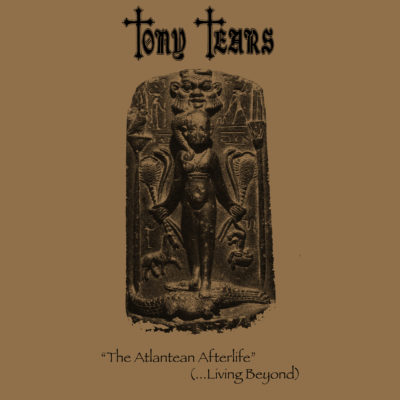
If our readers had never engaged with a Tony Tears album before, how would you describe it?
A journey, a communication beyond reality, and I mean that sincerely without diminishing the previous works of Tony Tears.
The album is rooted in Egyptian iconography. Why is this landscape and ancient culture integral?
Regarding the themes of our works, Antonio always takes care of them. He follows a personal path, one that he lives in reality, beyond any simple presentation of themes, which of course he know intimately. This album is no exception.
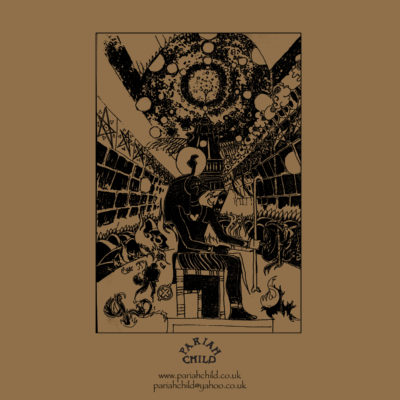
The album is presented in two halves, in the Italian language first and the English language second. This balance seems significant rather than convenient. What was the band’s intention?
Antonio always wants to be free and the same goes for the band. Avoiding easy labels, he does what he feels right. If that means making a song with an Italian text, he does just that. Should he be more inspired by a song in English, he adapts. He sets no limits. Convenience zero. Naturally, two genres blend in Tony Tears: ‘70s Dark Sound music strongly inspired by Italian bands, such as Jacula and Goblin (Antonio mentions this pair most often to me). Often for this style he prefers that they are sung in our mother tongue. Then there is Metal (by which we mean 360° of Metal), where he prefers to have an international aspect, and therefore, over these compositions, he opts for them being sung in English.
To what extent did you write or shape the lyrics and their corresponding melodies? Or did Antonio, as master of ceremonies, devise the respective parts in entirety for Davide and your good self?
Davide and I applied our vocal interpretations to the new album and were free to do so. As far as I’m concerned, whether I sing in Italian, English or phonetically, my style remains improvised even if in a musical context it is not.
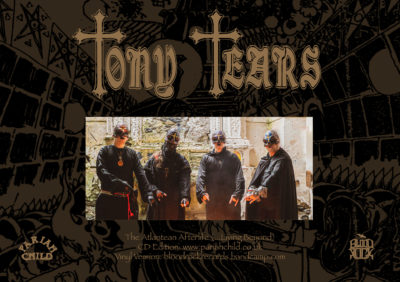
Out of interest, do you have a personal preference for the Italian mother tongue, English or wordless harmonisation when you sing?
I was born from improvisation and honestly I feel more fluid expressing myself with the phonetic approach. But I disdain neither our mother tongue nor the English language. I would add, however, in addition to singing in Italian and sometimes in English with Tony Tears, I use phonetics and have customized my style a lot. Perhaps it appears more like a song in a real language even if it is invented. Initially, Antonio encouraged me to develop it and nowadays I’m comfortable with this approach. I have to say, he was right. This new way of personalising phonetics makes everything unique, for both me and also for the band.
Tony Tears, as I understand, deliberated long and hard on the striking artwork that binds the new opus. Would you please elaborate on its significance?
Antonio has explained to me that the concept is about a Cult that originates from a time before the Egyptians (dating back to Atlantis). However, the Egyptians are the ones from whom we can gain the strongest sense of this Cult. Antonio told me that for a variety of reasons, calculations, and more, this Cult (linked to Magic and Reincarnation) is destined to return. It’s a very profound topic and no doubt he will answer more fully in the future…
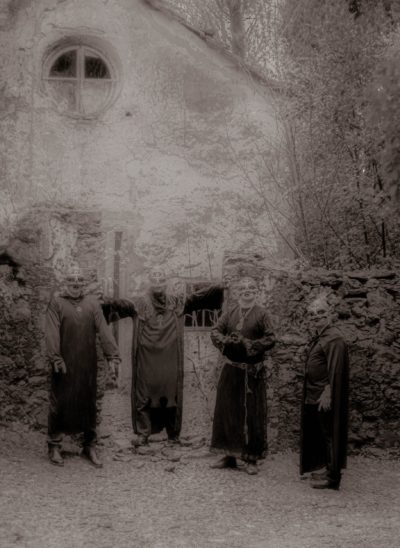
Masks, also remain at the beating heart of Tony Tears! A certain symbol, an Egyptian cross, is repeated on each mask with a different colour in the background for band members. Any comment on these designations?
Even these living masks, as Antonio likes to call them, have an Ankh on them to represent the origin of the Cult. The Ankh, according to him, is not the Egyptian key but rather the key of the one who taught us everything on earth. The colours in the background are the Entities of each of us, without which every effort of will would remain in vain. To keep it brief and to the point, each colour is the essence and the cross the quintessence, the effort and origin bound together.
Why do you not wear a mask or appear together in the band photograph by the burning altar?
I don’t wear the mask out of personal choice. I prefer facial expressions while also respecting the Tony Tears principle. But you must understand that we, the band and I, live in different cities and it was not practically possible for pandemic reasons to move from Rimini to Genova, and therefore, for this album photo shoot I was forced to do mine alone in my city.
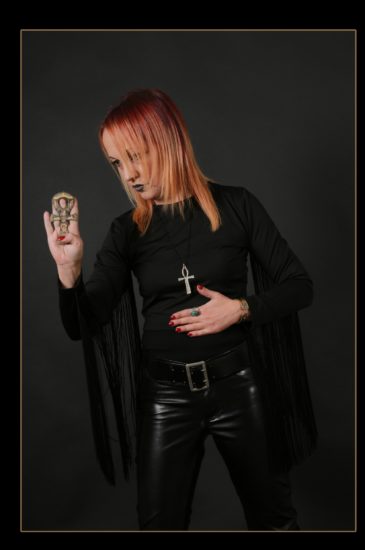
As there may be no (or only very limited) opportunities to celebrate ‘The Atlantean Afterlife (…Living Beyond)” on stage, how do you intend to spend 2021?
It’s difficult to say. Things can change from moment to moment. I will certainly find freedom of expression in other objectives. I’m always looking for something new.
Any other burning ambitions at this point in your life?
It is forbidden to stop. You can evolve in a thousand ways, just look for, and feel other ways. The important thing is to go beyond yourself and learn.
Thank you for sharing, Sandra! Do you have any parting messages for our readers?
Thank you Danny for giving me the opportunity of this interview. The only thing I can say to every one of you is this message: Always be true to yourself and always pursue your dreams. Hugs to all!
Danny Angus (March / May 2021)
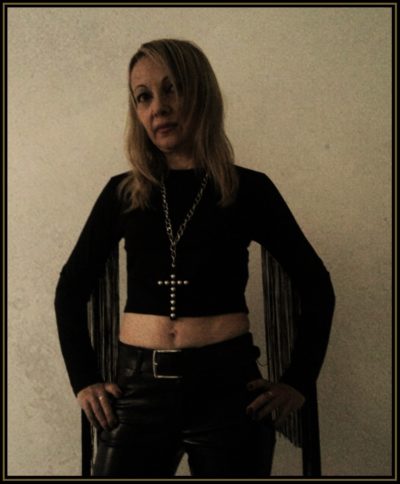
To order any item from our catalogue, please email pariahchild@yahoo.co.uk for current pricing, shipping, and bundle discounts.

 Sandra Silver
Sandra Silver 